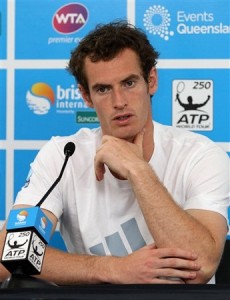
Andy Murray of Britain talks to the media at a press conference during the Brisbane International tennis tournament in Brisbane, Australia, Tuesday, Jan. 1, 2013. AP/Tertius Pickard
BRISBANE, Australia — People have been treating Andy Murray differently since he won his first major and ended that long, long drought for British men at tennis’ Grand Slam events.
He’s been given some free rides, lots of accolades and — just for something new at the start of the season in Australia — he didn’t have to answer a single question about Fred Perry, or 1936. He had been peppered with those on his previous trips Down Under since 2006.
“I’ve had a lot of congratulations because a lot of people that were sort of general sports fans kind of knew my story a little bit of how long it had been since any British player had won a Slam and how many times I had lost in the finals,” Murray said Tuesday as he prepared for his title defense at the Brisbane International. “It was very nice for me to finally be able to move on and not worry about that stuff anymore.
“I got a few upgrades on flights and things like that, which is nice, but that’s died down a little bit over the last few months.”
The Brisbane International was the first of Murray’s three titles in 2012 — the other two were at the London Olympics and the U.S. Open, which both came after he thought was a devastating loss in the Wimbledon final.
“I probably just feel a little bit more relaxed maybe the last few weeks than I normally do a few weeks out from a Slam,” he said. “I’m sure once I get on the court everything stays the same.”
This time last year, he seemed to be more on edge, still desperate for a breakthrough after losing the previous two Australian Open finals, and his player-coach relationship with Ivan Lendl was new.
The tune-up in Brisbane didn’t get him over the line at Melbourne Park last year, but it paid off later in the year when he ended a sequence of four Grand Slam final defeats by finally winning one — the first in 76 years for a British man since Perry’s last win in America.
“I always prepared to give myself the best chance to win the event. The last few years I’d got close but never managed to get over the final hurdle,” he said. “So whether it was a mental thing, whether it was things in my game I needed to improve, physical things … who knows exactly?
“But now that I’ve managed to do it, I hope that when I’m in those situations again I’ll deal with them better and put less pressure on myself, which will help me play better.”
Despite all the public acclaim, Murray didn’t receive Britain’s highest civic honor — a knighthood — in the New Year’s list, although other athletes did.
Not that it bothered the 25-year-old Scot.
“You need to do a lot for a long time to deserve an honor like that,” he said. “I’ve only been doing it for a couple of years so I’ll definitely need to win a few more matches and have more tournaments to have a chance of getting that.”
Sir Andy might have a nice ring to it, but it’s not really the way he’s ready to be addressed.
“With the people around you, everyone just kind of stays the same (after a knighthood) — it’ll be people that you don’t know that will come up to you and address you as that,” he said. “But I wouldn’t want my friends and family to call me like that.”